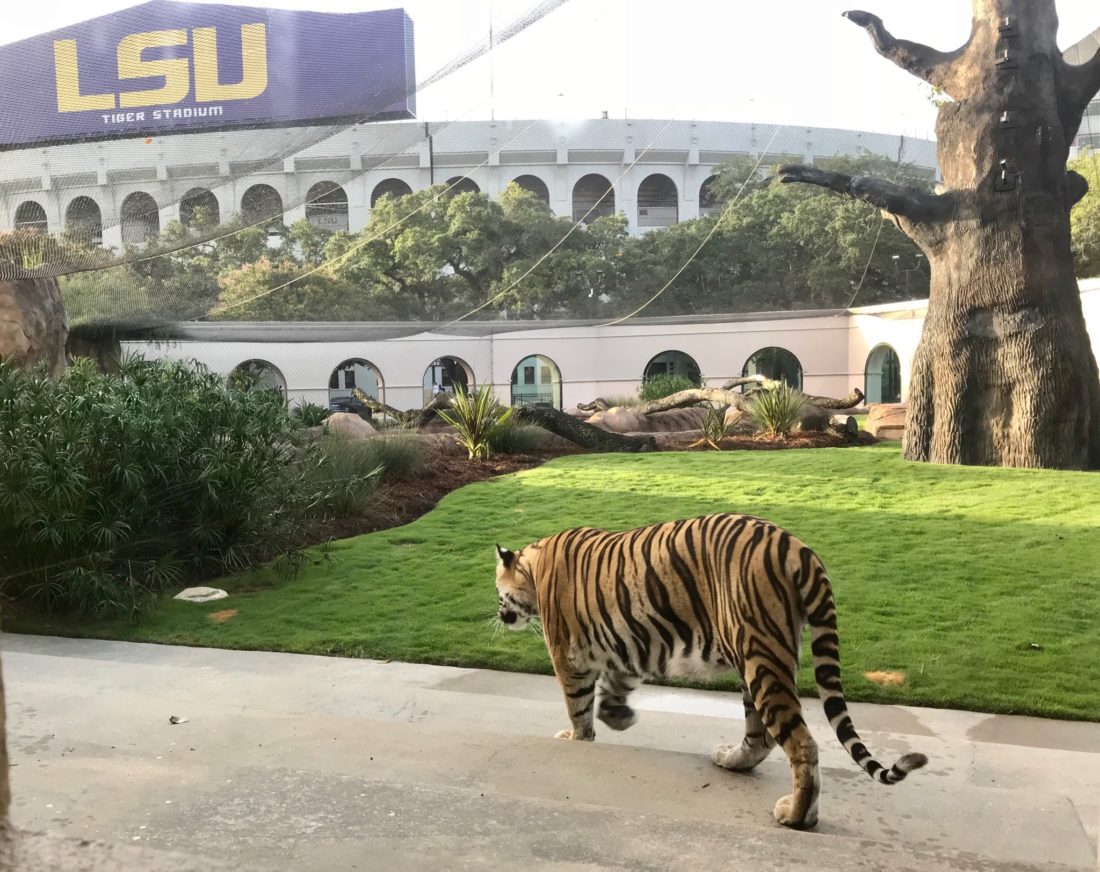Many college football teams rally around live-animal mascots—hounds, raptors, horses, longhorn bulls. But what happens when the mascot is also an endangered species? For Louisiana State University at Baton Rouge and Mike, their seventh in a line of Bengal tiger mascots, the answer is: Whatever’s best for Mike.
“It’s a very serious business to be acquiring an animal on the endangered species list—especially an apex predator,” says Dr. David Baker, LSU’s attending veterinarian who took over the care of Mike V in 1994, then helped locate Mike VI in 2007, and now supervises the care of Mike VII since the big cat arrived on campus last year. More tigers live in captivity or as exotic pets—as many as 7,000 in the U.S., according to some estimates—than in the wild, where only 2,500 Bengal tigers remain, mostly in India and surrounding countries. “There are so many tigers in this country because people breed them irresponsibly,” Baker says. Over-breeding leads to a black-market tiger trade, a cycle with grim outcomes. That’s what propelled LSU to begin seeking out tigers that need to be saved.
Finding Mike VI in 2007, for instance, nearly ran Baker and the university into a legal landmine. “I was twenty-four hours away from flying to the east coast to get a tiger when I was told by a federal agent it had been illegally sold,” Baker says. “Had I brought him to Louisiana, I would’ve been arrested as soon as I stepped off the plane and LSU would have been named in a criminal lawsuit.” The school went back to the drawing board, before legally obtaining a tiger from a sanctuary in Indiana that could not properly care for its cats.
Ten years later, after Mike VI lost a battle with cancer, Baker helped acquire Mike VII—née Harvey—from a Florida sanctuary that was being forced to downsize. Although Baker believes the sanctuary’s then-owner would not have put his fourteen tigers in harm, any potential buyer easily could have. Now, one of those cats is safe inside a 15,000-square-foot habitat, complete with a waterfall and pool, synthetic rocks that can be warmed or cooled, and lush greenspace, adjacent to Tiger Stadium.

Photo: Eddy Perez, LSU Strategic Communications
Mike VII.
Since 1936, when LSU Athletic Department trainer Chellis “Mike” Chambers (Mike’s namesake) and a handful of students and faculty members brought Mike I to campus, the tigers have roared the team on to victory from the sidelines—a tradition that ended last year. Despite the rah-rah value a live tiger can bring to a football game, the caretaking philosophy of LSU’s veterinarians has evolved to focus exclusively on Mike’s well-being. “If it’s best for Mike, then it’s best for LSU,” Baker says. “Imagine having a large party in your backyard with lots of people and music—you won’t see your cat for a week. That was Mike on the field.”
Even though Mike VII is the first tiger to remain in his enclosure on gameday Saturdays instead of gracing the sidelines, he’s still a cheerleader for the team, often eating a pre-game snack of meat laid out in the shape of the opponent’s mascot. And even though fans may not see him as often, Mike remains a lasting symbol of strength, inspiring thousands each season.
“I’ll be talking to grown men who went to LSU and I can’t have a conversation with them without them tearing up, because Mike means so much to the community,” Baker says. “Mike reminds people of everything good they remember about LSU—and there’s a lot of good to remember.”
Watch Mike on the Tiger Cam, or follow him on Instagram, Facebook, and Twitter.
Read about Southern college football traditions:
>> Georgia’s hedges: How they endure and thrive
>> Florida State’s Sod Cemetery: “A grave responsibility”
>> Auburn’s Toomer’s Corner: Touchdowns, trees, two-ply








